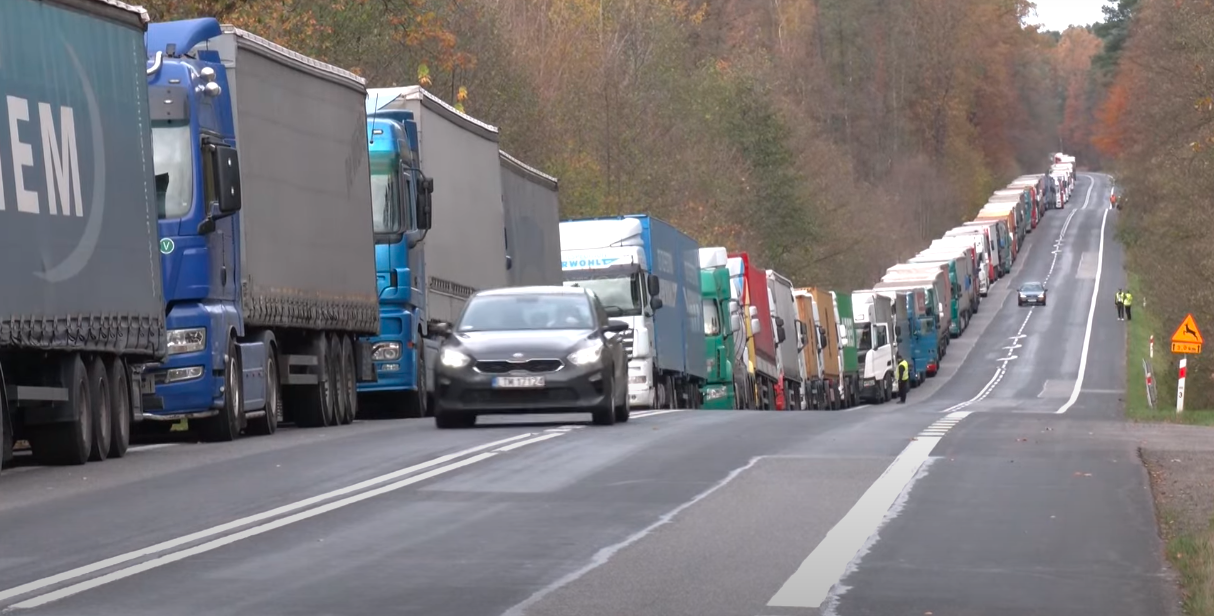Expert: Immediate lift of border blockade vital for Ukraine-Poland economies
A week-long blockade at Ukraine-Poland border by Polish transport workers halts thousands of vehicles, causing trade disruptions and urgent calls for government action to prevent economic losses for both countries. The post Expert: Immediate lift of border blockade vital for Ukraine-Poland economies appeared first on Euromaidan Press.

Poland and Ukraine need to promptly resolve the blockade at their border crossings to reduce the economic impact of the Polish transport workers’ strike for both countries, argues Ukrainian economist Iryna Kosse from the Institute for Economic Research and Policy Consulting in her article published by European Pravda.
The Ukrainian-Polish border remains blocked for over a week now due to ongoing protests led by Polish transport workers. As a result, three key border checkpoints have experienced complete or partial shutdowns, significantly disrupting both travel and commercial activities.
The obstruction started when a recently formed “Committee for the Protection of Carriers and Employers in the Transport Sector” began protests at key checkpoints along the Ukraine-Poland border. This committee is backed by Poland’s anti-Ukrainian “Confederation” party. Specifically, the Yahodyn-Dorohusk and Rava-Ruska – Hrebenne crossings are entirely shut down in both directions. Meanwhile, the Krakovets-Korczowa crossing is closed for those seeking to enter Ukraine, but open for exits.
Initiated at midday on 6 November, the strike has resulted in roughly 20,000 vehicles being stranded at the border, as reported by Ukraine’s Ministry of Infrastructure, with their movements to their intended destinations halted.
On the other side, Poland’s customs service has noted that as of 9 a.m. on 10 November, the exit queue at the Yahodyn-Dorohusk border crossing included approximately 1,300 vehicles. At the Rava-Ruska – Hrebenne crossing, around 550 vehicles were lined up, while the Krakovets-Korczova had about 520 vehicles waiting to cross.
“Ukrainian officials have already tried to negotiate directly with the border blockaders but unsuccessfully,” the expert notes.
“We did not reach any agreements. The Ukrainian side does not take into account our demands,” said the protest organizer in the Polish border town of Dorohusk and head of the Lublin branch of “Confederation,” Rafal Mekler.
Iryna Kosse notes that the protesters’ demands are unacceptable for Ukraine, and, accordingly, the chances of later reaching a compromise are clearly low.
Economic impact
Raising the question of what the cost of this blockade is for the Ukrainian economy and which sectors will suffer the most, the expert offers the following analysis.
First of all, there are direct losses for Ukrainian carriers who cannot fulfill their contracts.
Oleksandr Kyryliuk, who heads the international road transport department at the logistics firm ZAMMLER, estimates that a single day of downtime for one truck incurs a cost of 300-350 euros in working capital for Ukrainian transport companies.
- Border crossing statistics from the eCherha (“there’s a queue”) system for October show that Polish border checkpoints averaged 1,140 trucks with cargo crossing per day.
- The three currently blocked checkpoints averaged 960 vehicle crossings per day in October, representing 84% of total crossings of the Polish border. Another 285 trucks per day exited via two other checkpoints empty.
- Of these 960 trucks, some rerouted in time after heeding warnings of the strike, some managed to get through, and some are now stuck in line at the border. For example, Yahodyn-Dorohusk averaged 70 truck crossings per day from November 7-10.
- Krakovets-Korczova and Rava-Ruska – Hrebenne averaged 270 and 74 crossings respectively.
“So approximately 546 trucks per day at these three border crossing points were unable to cross the border and got stuck in line. Multiplying this by 300 euros, we get 164,000 euros per day in direct losses due to downtime,” the expert says, noting that it is only the tip of the iceberg, since Ukraine’s losses are not limited to carrier losses alone.
The cumulative financial impact is expected to be substantial, extending beyond immediate losses to include risks for businesses, exporters, and importers. The inability to honor contracts and the consequent suspension of production are anticipated outcomes of this situation.
Border blockade by Polish drivers “damaging for all,” Ukrainians say
Given that Shehyni-Medyka is currently the sole border checkpoint open to trucks on the border with Poland — with other crossings only permitting vehicles up to 7.5 tons — the export and import of goods face considerable complications.
In October, road transport was responsible for 36% of propane-butane imports, 18% of gasoline imports, and 16% of diesel fuel imports. Despite assurances from protesters to allow fuel trucks passage, the blockade may lead to shortages of certain types of fuel and other goods, affecting the market and consumption.
“On the other hand, the impact on agricultural exports may be insignificant,” Iryna Kosse notes.
Reviewing September’s statistics for agricultural exports—since October figures are not yet available—road transport accounted for just 7% of the total. The predominant channels for agricultural exports are railways, comprising 64%, and seaports at 26%. Consequently, there is an expectation that the Polish carriers’ strike will not significantly disrupt the export of grains and other agricultural goods, as existing distribution can be diverted to alternative routes, according to the expert.
Grain traders have observed that in response to the strikes and disruptions at the Polish border, road carriers have increased the volume of cargo transport through Hungary and Slovakia. However, it’s not feasible to augment transport volumes across the Romanian frontier currently, due to the ongoing reconstruction of the “Porubne – Siret” border crossing, which is the largest checkpoint with Romania.
Ukrainian exporters and Polish businesses in loss from blockade
“Who has lost the most from this strike? Exporters. But not of agricultural products, but of other goods,” Iryna Kosse says.
For instance, Interpipe, a metal products company, ships its goods via road transport using over a thousand vehicles each month. Similarly, glass producers export their products to European factories. In addition, commodities like timber, furniture, foodstuffs, and pharmaceuticals are also commonly transported by road for export.
Accordingly, “Ukrainian customs, and with it the country’s budget, loses along with exporters. Importers will also suffer, primarily of fuel, plastic products, and food.”
“This means that Polish businesses are also incurring losses from this blockade. It is possible that these losses are comparable to Ukraine’s,” the expert warns.
“In such a situation, the fastest lifting of the blockade fully meets the interests of both Kyiv and Warsaw. The governments of both countries must respond urgently, looking for ways to resolve the conflict and restore normal traffic at the border in order to avoid deepening the economic consequences,” the expert concludes.
Read also:
- Slovak carriers threaten to join Poland in blocking Ukrainian border
- Polish truckers reject Ukraine’s compromise offers, continue strike
- Border blockade by Polish drivers “damaging for all,” Ukrainians say
The post Expert: Immediate lift of border blockade vital for Ukraine-Poland economies appeared first on Euromaidan Press.



